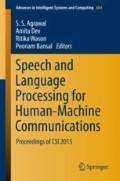Abstract
In this generation of IT, communicating with machines in an expedient manner using human speech that too in their own language is highly desirable. This is achieved using speech recognition systems which allow the general public to speak to the machine by recognizing their voice. Hindi being the most widely spoken language with approx. 260 million first-language speakers [1] should have a real-time recognition system. The main objective of this paper is to develop a speaker-independent system which can recognize continuous Hindi speech in real-time scenario. This paper presents the feasibility of MFCC for feature extraction and dynamic time warping to compare the test sequence. The system has been trained on 8 h of audio data and a trigram language model trained with 30K words. With a dictionary of 6K words, the system gives a word accuracy of 80–85%.
Access this chapter
Tax calculation will be finalised at checkout
Purchases are for personal use only
References
Information please. http://www.infoplease.com/ipa/A0775272.html
Sinha, S., Agrawal, S.S., Jain, A.: Continuous density hidden markov model for context dependent Hindi speech recognition. In Advances in Computing, Communications and Informatics (ICACCI), International Conference on 2013, pp. 1953–1958. doi:10.1109/ICACCI.2013.6637481 (2013)
Samudravijaya, K.: Computer recognition of spoken hindi. In Proceeding of International Conference of Speech, pp. 8–13. Music and Allied Signal Processing. URL http://speech.tifr.res.in/chief/publ/00hindiReco.doc (2000)
Pruthi, T., Saksena, S., and Das, P K.: Swaranjali: isolated word recognition for hindi language using vq and hmm. In International Conference on Multimedia Processing and Systems (ICMPS), IIT Madras. URL http://citeseerx.ist.psu.edu/viewdoc/download?doi=10.1.1.144.4538&rep=rep1&type=pdf (2000)
Neti, C., Rajput, N., Verma, A.: A large-vocabulary continuous speech recognition system for hindi. IBM J. Res. Dev. URL http://citeseerx.ist.psu.edu/viewdoc/download?doi=10.1.1.17.5089&rep=rep1&type=pdf (2004)
RajatMathur, Babita, and Abhishek Kansal. Domain specific speaker independent continuous speech recognizer using julius. In Proceedings of ASCNT, pp. 55–60. Noida, CDAC (2010)
Kumar, K., Aggarwal, R.K.: Hindi speech recognition system using htk. Int. J. Comput. Bus. Res. 2, URL http://www.researchmanuscripts.com/PapersVol2N2/IJCBRVOL2N2P3.pdf (2011). ISSN 2229-6166
Gupta, R., Sivakumar, C.: Speech recognition for hindi language. Master’s Dissertation. IIT BOMBAY (2006)
Venkataramani, B.: Sopc-based speech-to-text conversion. In Nios II Embedded Processor Design Contest Outstanding Designs, pp. 83–108. URL https://www.altera.com/en_US/pdfs/literature/dc/2006/i2.pdf (2006)
Aggarwal, R.K., Dave, M.: Using gaussian mixtures for hindi speech recognition system. Int. J. Signal Process. Image Process. Pattern Recogn. 2(4). URL http://www.sersc.org/journals/IJSIP/vol4_no4/13.pdf (2011)
Mishra, A.N., Chandra, M., Biswas, Astik., Sharan, S.N.: Robust Hindi connected digits recognition. Int. J. Signal Process. Image Process Pattern Recog. 4(2):79–90. URL http://www.sersc.org/journals/IJSIP/vol4_no2/8.pdf (2011)
Sivaraman, G., Samudravijaya, K.: Hindi speech recognition and online speaker adaptation. In International Conference on Technology Systems and Management (ICTSM), Int. J. Comput. Appl.® (IJCA). pp. 27–30 (2011)
Acknowledgements
The assistance of Mr. A.K. Dhamija in this work is acknowledged. We also thank the management of KIIT College of Engineering, above all Dr. Harsh Vardhan Kamrah and Dr. Neelima Kamrah for providing required facilities, financial help, and support.
Author information
Authors and Affiliations
Corresponding author
Editor information
Editors and Affiliations
Rights and permissions
Copyright information
© 2018 Springer Nature Singapore Pte Ltd.
About this paper
Cite this paper
Sharan, S., Bansal, S., Agrawal, S.S. (2018). Speaker-Independent Recognition System for Continuous Hindi Speech Using Probabilistic Model. In: Agrawal, S., Devi, A., Wason, R., Bansal, P. (eds) Speech and Language Processing for Human-Machine Communications. Advances in Intelligent Systems and Computing, vol 664. Springer, Singapore. https://doi.org/10.1007/978-981-10-6626-9_10
Download citation
DOI: https://doi.org/10.1007/978-981-10-6626-9_10
Published:
Publisher Name: Springer, Singapore
Print ISBN: 978-981-10-6625-2
Online ISBN: 978-981-10-6626-9
eBook Packages: EngineeringEngineering (R0)

